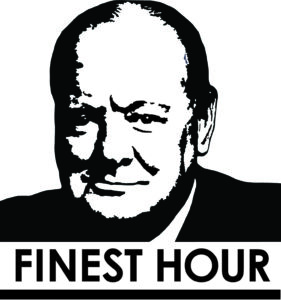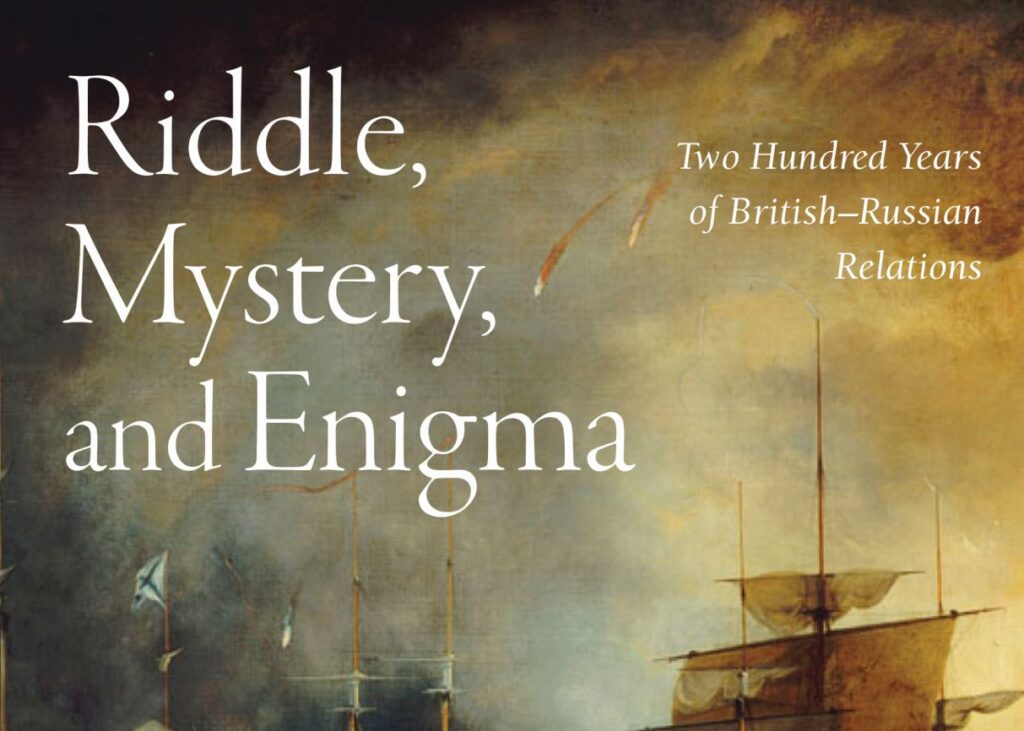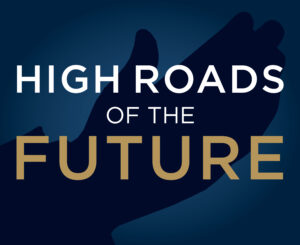
Finest Hour 196
Books, Arts, & Curiosities – The Enigma of Russia

May 17, 2023
Page 44
Review by W. Mark Hamilton
W. Mark Hamilton is author of The Nation and the Navy: Methods and Organization of British Navalist Propaganda, 1889–1914 (1986).
David Owen, Riddle, Mystery, and Enigma: Two Hundred Years of British–Russian Relations, Haus, 2021, 354 pages. £15.59/$29.95. ISBN 978–1913368395
This timely and compelling book by former British foreign secretary David Owen (now Lord Owen) looks at 200 years of British-Russian political relations. Rather than being a straight history, Owen states that the book “captures a series of personal views on a relationship that has been deteriorating in recent years.” One of the most prominent figures in this dynamic relationship was Winston Churchill, and Owen draws his title from Churchill’s famous description of Russia in October 1939 as “a riddle wrapped in a mystery inside an enigma.”
In describing the enigma of Russia, Churchill had been responding to the public’s questions about the shocking Nazi-Soviet alliance formed just before the outbreak of the Second World War with the signing of the Russo-German Non-aggression Pact—eerily similar to the pledge of friendship between Russia and China made almost immediately before Putin launched his attack on Ukraine. Churchill acknowledged that he could not predict Russia’s actions. But he used his great rhetorical gift to explain that, although the riddle of Russia was impenetrable, “Perhaps there is a key. That key is Russian national interest.”

2024 International Churchill Conference
For most of Churchill’s long life, Anglo-Russian relations were chilly, with occasional periods of cooperation, as the British and Russian Empires clashed around the world. The Anglo–Russian relationship started off well in the early nineteenth century as both nations worked together for Greek independence from the Ottoman Empire. This alliance culminated in the great naval Battle of Navarino in 1827. Owen believes that it was then that Russia under Tsar Nicholas I embraced orthodoxy, autocracy, and nationality, which would survive in various forms to the present day. Great Britain chose a diametrically opposite path, cultivating democracy and free speech instead, with liberalism a growing political force.
A few decades later, when Britain and France battled Russia in the Crimean War (1853–1856), Russia suffered a humiliating defeat. This loss, Owen states, laid the foundation for growing Russian nationalism and increased proSlavic sentiment.
By the end of the nineteenth century, Russia and Britain were playing the “Great Game” in Central Asia, where both nations tried to deter expansion of each other’s empire, with Britain fearing Russian designs on British India as Imperial Russia advanced south and east to establish its Asiatic empire. Churchill became familiar firsthand with Russian duplicity and cruelty to its people, along with its widespread government corruption.
With the advent of the First World War in August 1914, Britain and Russia were allies. Russia asked Britain in 1915 to occupy the Dardanelles and take control of the straits linking Europe and Asia, which would effectively take their mutual enemy, Ottoman Turkey, out of the war. Churchill and the British government supported Russia’s request, but the campaign proved disastrous. Though Churchill was forced out of the government in disgrace, this was not the last time he would be central to the Anglo-Russian relationship.
Churchill, who had a life-long fascination with Russia, regarded the Russian Revolution in 1917 as similar to the French Revolution, and he rightly feared that the Bolsheviks’ success would lead to the spread of communism. He supported an Allied military intervention in 1918 as a way to “strangle the Bolshevik baby in its crib,” proclaiming, “I will not submit to be beaten by the baboons!” Yet again, Churchill was on the losing side. Owen believes Churchill was obsessed by the Russian Civil War but in the end had to concede defeat. Britain formally recognized the new Union of Soviet Socialist Republics (USSR) in 1924.
With the coming of the Second World War, Churchill and Russia became joined on the world stage forever. After the unlikely Russo-German alliance collapsed dramatically when Germany invaded Russia in June 1941, Churchill allied his nation with its sometime enemy, Russia, in order to staunch Germany’s aggression. Owen’s account of the AngloRussian relationship during the war is well told, and the ChurchillStalin alliance receives special attention.
The last chapters are devoted to the post-Second World War relationship and its challenges for several British prime ministers and Russian leaders. Although Churchill’s global influence waned, he nursed a deep worry about the dawn of the nuclear age and the possible destruction it could unleash.
Despite Owen’s twenty-six years as an MP (1966–1992), his stint as the European Union’s peace negotiator in the former Yugoslavia in the early 1990s, and his tenure as chairman of a division of the former Russian petroleum company Yukos (2002–2005), he, along with most observers, did not foresee Vladimir Putin’s merciless Ukrainian actions and the execution of a long-term plan to restore Russia’s old spheres of influence. Nevertheless, even though the book was published a few months before the Russian invasion of Ukraine in early 2022, Owen did raise acute concerns about the rise of Putin. He also believes the West must press Putin for more open dialogue and mutual compromise.
The words of Winston Churchill in February 1919 seem most appropriate today: “If Russia is to be saved, as I pray she may be saved, she must be saved by Russians. It must be by Russian manhood and Russian courage and Russian virtue that the rescue and regeneration of this once mighty nation and famous branch of the European family can alone be achieved.”
Subscribe
WANT MORE?
Get the Churchill Bulletin delivered to your inbox once a month.




